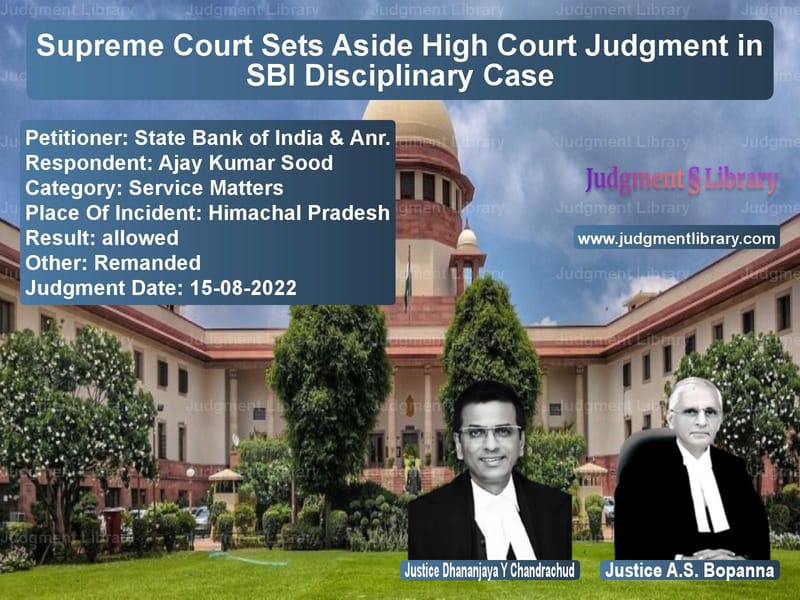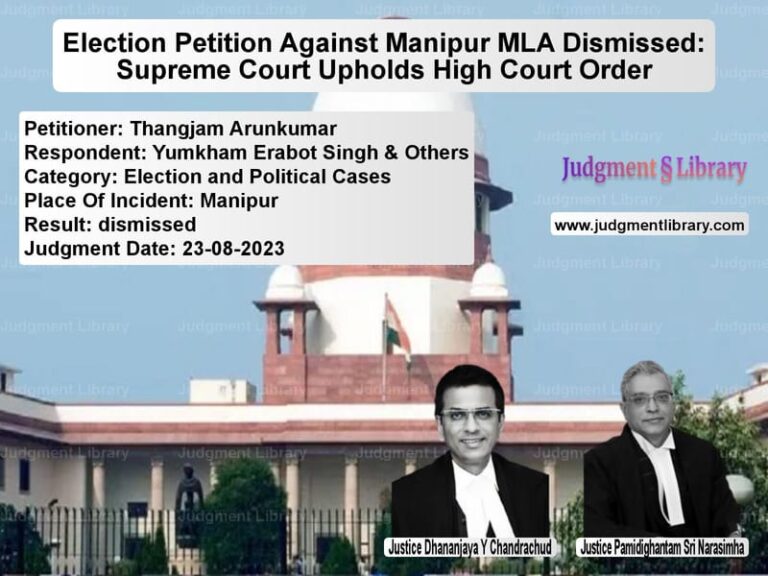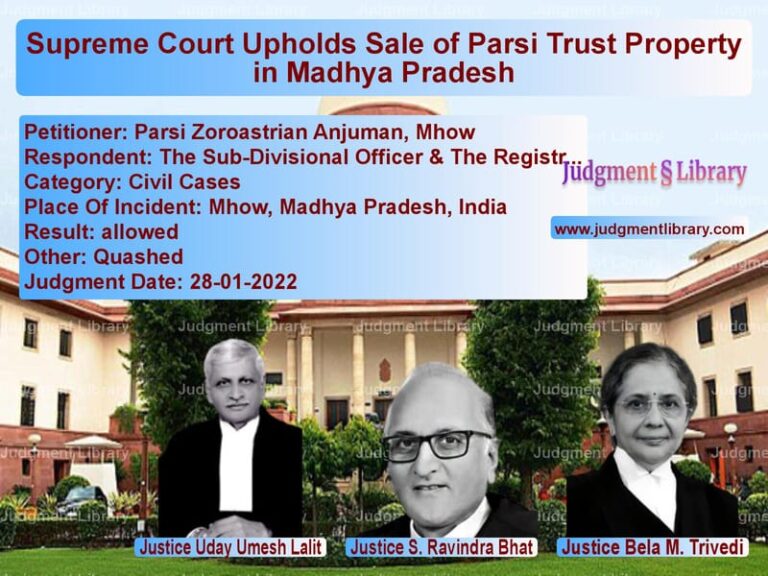Supreme Court Sets Aside High Court Judgment in SBI Disciplinary Case
The case of State Bank of India & Anr. vs. Ajay Kumar Sood revolves around a disciplinary action taken by the State Bank of India (SBI) against its employee for alleged misconduct. The Supreme Court set aside the High Court’s judgment due to its incomprehensibility and remanded the matter for fresh consideration.
Background of the Case
The case originated in 2013 when SBI issued a charge sheet to the respondent, Ajay Kumar Sood, alleging gross misconduct. The specific charges included:
- Disrupting the functioning of the bank branch.
- Misbehaving with the branch manager and using abusive language.
- Organizing demonstrations without prior notice.
- Preventing other employees from performing their duties.
- Disobeying office orders and unauthorized absence.
- Issuing cheques from an account with insufficient balance.
An inquiry officer found the respondent guilty of all charges in an enquiry report dated October 19, 2013. Based on this, SBI issued a show-cause notice on October 22, 2013, asking why he should not be dismissed. After granting a short extension, the disciplinary authority dismissed the respondent from service on November 6, 2013. The appellate authority rejected his appeal on January 3, 2014.
Legal Issues Before the Court
- Whether the disciplinary proceedings violated principles of natural justice.
- Whether the punishment of dismissal was disproportionate to the charges.
- Whether the High Court’s judgment was comprehensible and legally sound.
Arguments Presented
Petitioner’s (SBI’s) Arguments
- SBI contended that the respondent was found guilty of serious misconduct, and his dismissal was justified.
- The enquiry officer had provided a fair opportunity to the respondent to defend himself.
- The High Court’s judgment lacked clarity and could not be relied upon.
Respondent’s (Ajay Kumar Sood’s) Arguments
- The respondent claimed that the disciplinary proceedings were biased and violated principles of natural justice.
- He argued that the punishment of dismissal was too harsh for the charges proved against him.
- The Central Government Industrial Tribunal (CGIT) had found the punishment to be disproportionate and modified it to compulsory retirement.
Supreme Court’s Observations
On the High Court’s Judgment
The Supreme Court, comprising Justice Dhananjaya Y Chandrachud and Justice A.S. Bopanna, strongly criticized the High Court’s judgment for being incomprehensible.
“Judgments are intended to convey the reasoning and process of thought which leads to the final conclusion of the adjudicating forum. The judgment of the High Court is simply incomprehensible, leaving this Court with no option but to remand the proceedings.”
On the Purpose of Judicial Writing
The Supreme Court emphasized that judgments must be clear, concise, and comprehensible to litigants and the public.
“The judge must write to provide an easy-to-understand analysis of the issues of law and fact which arise for decision. Judgments of the High Courts and the Supreme Court also serve as precedents to guide future benches.”
On the Role of the Industrial Tribunal
The Court noted that the CGIT had found the penalty of dismissal harsh and modified it to compulsory retirement.
“Though a serious charge of misconduct was held to be established against the respondent, the penalty of dismissal was found disproportionate by the CGIT and was modified.”
Judgment and Its Implications
The Supreme Court allowed SBI’s appeal and set aside the High Court’s order. The key directives were:
- The case was remanded back to the High Court for fresh consideration.
- The High Court was directed to ensure clarity and reasoning in its judgment.
- The principles of judicial writing were reinforced to ensure that judgments serve their intended purpose.
Significance of the Judgment
- Ensures Judicial Clarity: The ruling reinforces that judgments must be comprehensible and logically structured.
- Protects Employees’ Rights: The decision upholds the principle that penalties in disciplinary proceedings should be proportionate.
- Reaffirms the Role of Tribunals: The judgment highlights that Industrial Tribunals have the authority to review and modify disproportionate penalties.
Conclusion
The Supreme Court’s ruling in State Bank of India & Anr. vs. Ajay Kumar Sood is a landmark decision emphasizing the importance of judicial clarity and proportionality in disciplinary proceedings. By remanding the case, the Court reaffirmed its commitment to ensuring that judgments are accessible, fair, and uphold the principles of justice.
Petitioner Name: State Bank of India & Anr..Respondent Name: Ajay Kumar Sood.Judgment By: Justice Dhananjaya Y Chandrachud, Justice A.S. Bopanna.Place Of Incident: Himachal Pradesh.Judgment Date: 15-08-2022.
Don’t miss out on the full details! Download the complete judgment in PDF format below and gain valuable insights instantly!
Download Judgment: state-bank-of-india-vs-ajay-kumar-sood-supreme-court-of-india-judgment-dated-15-08-2022.pdf
Directly Download Judgment: Directly download this Judgment
See all petitions in Employment Disputes
See all petitions in Disciplinary Proceedings
See all petitions in Public Sector Employees
See all petitions in Judgment by Dhananjaya Y Chandrachud
See all petitions in Judgment by A. S. Bopanna
See all petitions in allowed
See all petitions in Remanded
See all petitions in supreme court of India judgments August 2022
See all petitions in 2022 judgments
See all posts in Service Matters Category
See all allowed petitions in Service Matters Category
See all Dismissed petitions in Service Matters Category
See all partially allowed petitions in Service Matters Category







